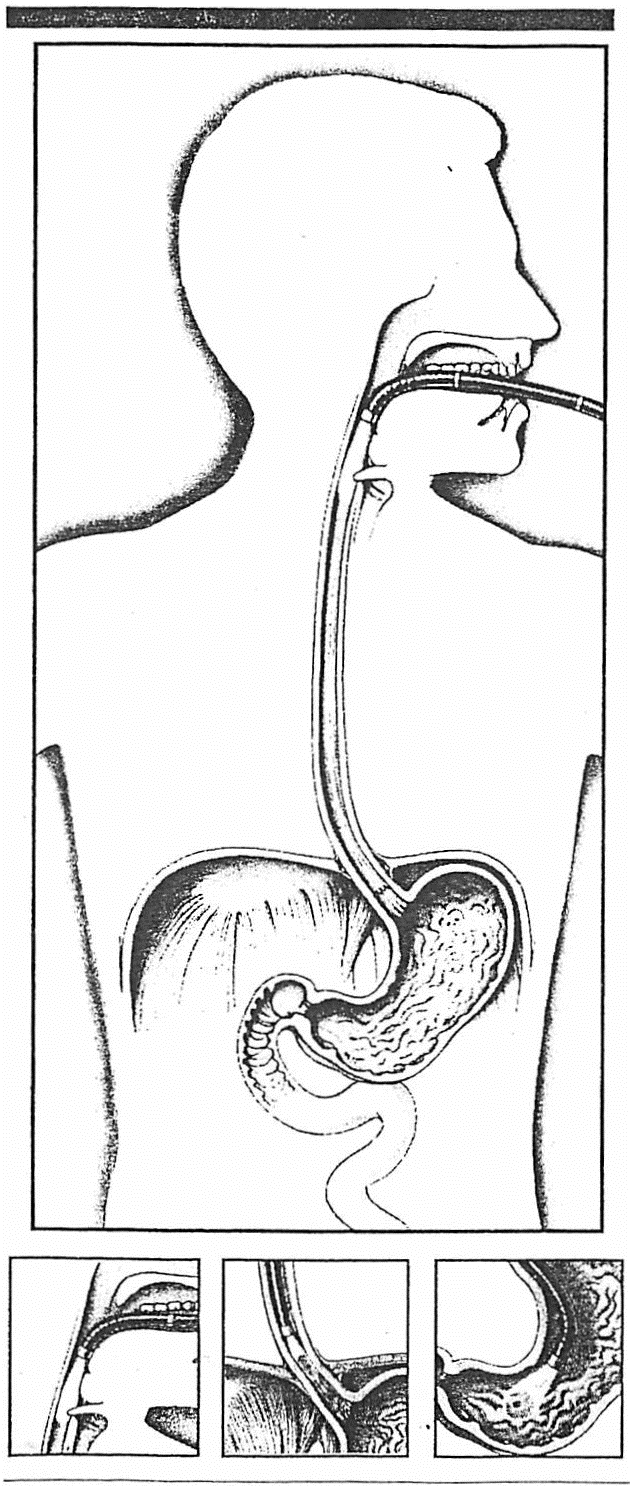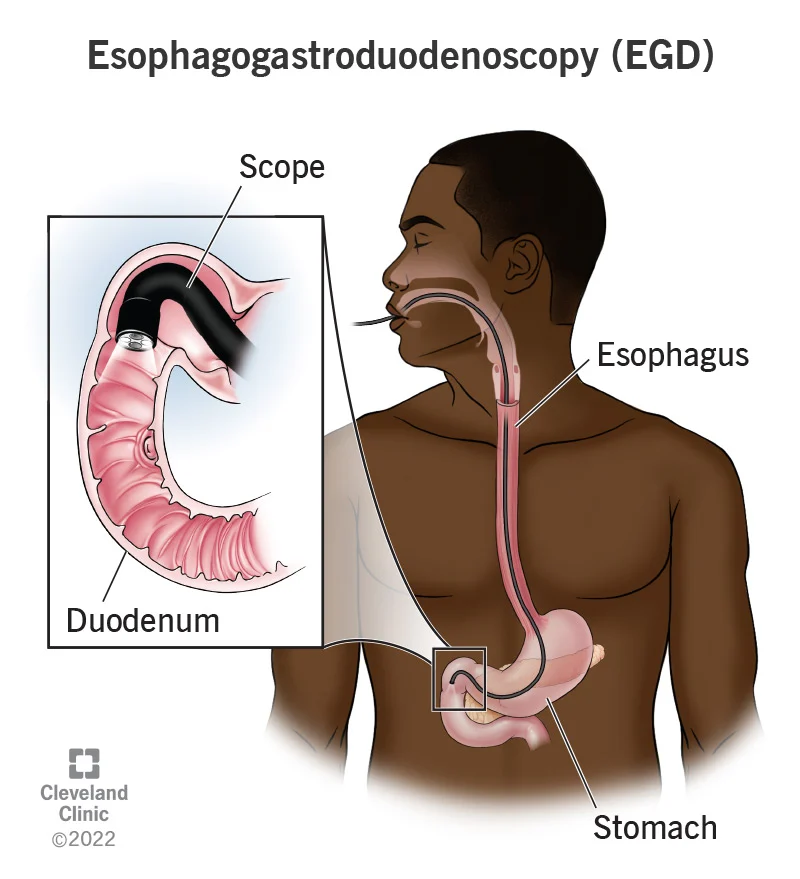You have been scheduled for gastrointestinal endoscopy (also called EGD, Esophagogastroduodenoscopy or panendoscopy).
Why am I having this test?
Your doctor has arranged this test for a look at your esophagus, stomach and duodenum to see if there are any abnormalities of the upper digestive tract.
What occurs during the examination?
The doctor will use a small, lighted flexible tube thinner than most of the food you swallow to examine the lining of the upper digestive tract.
We will numb your mouth and throat and use Tranquilizers to relax you. We don't obstruct breathing passages. We make a special effort to keep you comfortable. In fact, most patients don't even remember the procedure.
Are there any possible complications?
EGD is safe and is associated with a very low risk. Complications can occur but are rare.
- Hemorrhage (bleeding)
- Perforation (tearing) of the esophagus or stomach
- Pneumonia, or an adverse reaction to one of the medications.
Possible complications include:
You must tell us of allergies or peculiar reactions you have had to medicines, particularly novacaines and medicines that dentists use for deadening teeth, also tranquilizers and pain killers. In very rare circumstances death could result from a complication; however, we have had no deaths. It should be emphasized that complications are extremely rare. This is a routine procedure in our hands and we are extremely careful.
After the procedure:
- Expect a mild sore throat lasting one or two days. You can use lozenges for relief.
- Do not eat or drink for one hour (your throat will be numb and we don't want anything to go down the wrong "pipe").
- Do not drive for 24 hours after the procedure.

List of Aspirin or Aspirin Related Drugs
4-Way Cold Tablets
Adprin - B Tablets
A.S.A. Enseals
A.S.A. Tablets
Aches-N Pain Tablets
Advil
Alcohol
Aleve Tablets
Alka-Seltzer Products
Amigesic capsules
Anacin Tablets and Capsules
Anaprox, Anaprox DS Tablets
Anodynos Tablets
Ansaid Tablets
APC
Argesic Tablets
Artha-G Tablets
Arthralgen Tablets
Arthritis Bayer Timed Release Aspirin
Arthritis Pain Formula Tablets
Arthritis Strength Buffering Tablets
Arthropan Liquid
Arthrotec
Ascodeen
Ascriptin, All products
Asperbuf Tablets
Aspergum [chewing gum]
Aspirin
Asprimox Tablets
Axdone
Axotal Tablets
Bayer, All products
BC Tablets and Powder
Brufen
Buf-Tabs
Buff-A Comp No. 3 Tablets with codeine
Buff-A Comp Tablets and Capsules
Buffaprin Tablets
Bufferin, All products
Buffets II Tablets
Buffex Tablets
Buffinol Tablets
Cama Arthritis Pain Relieve
CataFlam Tablets
Cephalgesis
Cheracol
Children Aspirin
Children's Advil Suspension
Children's Motrin Suspension
Congesprin
Cope Tablets
Coricidin
Coumadin
Darvon Compound Pulvules
Darvon with A.S.A. Pulvules
Darvon Compound-65
Darvon-N with A.S.A.
Dasin Capsules
Daypro Tablets
DiFlunisal
Disalcid Capsules
Doan’s Pills
Dolobid Tablets
Dristan
Duoprin-S Syrup
Duradyne Tablets
Easprin
Ecotrin Tablets
Emagrin Tablets
Empirin Tablets
Emprazil
Endodan Tablets
Epromate Tablets
Equagesic Tablets
Equazine M Tablets
Etodolac
Excedrin Tablets and Capsules
Feldene Capsules
Fenoprofen Tablets
Fiorgen PF Tablets
Fiorinal Tablets
Fluriprofen Tablets
Gelpirin Tablets
Gensan Tablets
Goody's Headache Powder
Halfprin Tablets
Haltran Tablets
Ibu-Tab Tablets
Ibuprin Tablets
Ibuprohm Tablets and Caplets
Indochron E-R Capsules
Indocin Capsules/Suspension/ Suppositories
Indocin-SR Capsules
Indomethacin Capsules
Indomethacin Suspension
Isollyl Improved Tablets & Capsules
Ketrolac Tablets
Ketoprofen Capsules
Lanorinal Tablets
Lodine Capsules /Tablets
LodineXL
Lortab
Magan Tablets
Magnaprin Arthritis Strength Captabs
Magsal Tablets
Mamal Capusles
Marthritic Tablets
Maximum Bayer Aspirin
Measurin Tablets
MecloFenamate Capsules
Meclomen Capsules
Medipren Tablets and Caplets
Menadol Tablets
Meprogesic Tablets
Micrainin Tablets
Midol 200 Tablets
Midol, All products
Mobidin Tablets
Mobigesic Tablets
Momentum Tablets
Motrin Tablets
Nalfon Capsules/Tablets
Nalfon Pulvules
Naprosyn Tablets/Suspension
Naproxen Tablets
Neocylate Tablets
Norgesic & Norgesic Forte Tablets
Norwich Extra-Strength Tablets
Nuprin Tablets and Caplets
Orphengesic
Orudis Capsules
Oruvail Capsules
Pabalate
Pabalate-SF Tablets
PAC Tablets
Pamprin-IB Tablets
Pepto-Bismol Tablets and Suspension
Percodan and Percodan Demi Tablets
Phenaphen
Piroxicam Capsules
Ponstel Capsules
Presalin Tablets
Relafen Tablets
Robaxisal Tablets
Rufen Tablets
S-A-C
Saleto Tablets Capsules,
Saleto-200 Tablets
Saleto-400,600,800 Tablets
SalFlex Tablets
Salocol Tablets
Salsalate Tablets
Salsitabs Tablets
Sine-Aid
Sine-Off
SK-65 Compound Capsules
Soma
Soma CMD
St. Joseph Adult Chewable Aspirin
St. Joseph Cold Tablets for Children
St. Joseph Aspirin for Children
Sulindac Tablets
Supac
Synalgos Capsules
Synalgos-DC Capsules
Talwin Compound Tablets
Tolectin 200,600 Tablets
Tolectin DS Capsules
Tolmetin Tablets/Capsules
Toradol
Injection/Tablets
Trendar Tablets
Tricosal Tablets
Tri-Pain Tablets
Trigesic
Trigesic Tablets
Trilisate Tablets and Liquid
Vanquish Caplets
Verin
Voltaren Tablets
Zactin
Zorprin Tablets
North Broward
201 East Sample Rd
Pompano Beach, FL
(954) 941-8300
Coral Springs Medical Center
3000 NW 96th Ave
Coral Springs, FL 33065
(954) 344-3000
Broward General Medical Center
1600 S Andrews Ave
Fort Lauderdale, FL 33316
(954) 355-4400
Surgery Center at Coral Springs
967 North University Drive
Coral Springs, FL 33071
(954) 509-1367
Northwest Medical Center
2801 N State Rd 7
Margate, FL 33063
(954) 974-0400
Boca Outpatient Surgical Center
501 Glades Road
Boca Raton, FL 33432
(561) 367-6090


